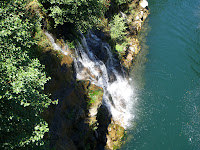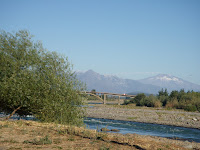

On the way to my mother's childhood Methodist summer camp, where my aunt would stay for a week on a pastoral retreat, we passed rivers and waterfalls that run through the very fertile but dry land.


 (This is what the streets in the smaller towns look like.)
(This is what the streets in the smaller towns look like.)The summer camp was founded by the Methodist missionaries that arrived in Chile from the US. In its heyday, when my mother attended as a child, the camp spread for miles to the foothills of the coastal range. There were fields of chard and corn as far as you could see. An apple and peach orchard nestled between the old cedar forest bordering the river and the crop plantations. There were horses in the stable and hundreds of milking cows. The paths were lined with fragrant eucalyptus trees with huge trunks (it took two people to hug one.) Quite profitable, I'm told.
The church has since been turned into national hands; the missionaries all returned. The Chilean management has not been so enterprising. My mother and I walked through the shell of what the camp had once been. The outlying areas were sold off, the stable cool and quiet, empty but for piles of straw. The orchards all cut down. It was beautiful, in a sad sort of way.
The cabin she remembers staying in as a child was abandoned.
We stayed in another cabin, and braved the cold water showers.
-------------------------
Tuesday the effort of many telephone calls by my aunt came to fruition. I was put into contact with, through familial and friendly ties, to two highly respected individuals of indigenous descendance, (but also thoroughly integrated Chileans), who agreed to meet with me to discuss the current issues for Chile's largest indigenous group, the Mapuches.
Wednesday morning we drove the two hours to Temuco, the largest city in the tenth region of Chile, where the Mapuche population is concentrated. After a tour of the city's crowded indoor artisan market, showcasing traditional indigenous wool garments, wooden bowls, stone mortars, horn trumpets, and delicate silversmithing, we headed to the less populated, calmer side-city of Nueva Imperial, where we would meet on of the contacts.
Walking throught the neighborhood on the outskirts of the city seeking the right house, I for the first time encountered the discrimination against Mapuches. Unsure we were on the right avenue, we asked a man who seemed to be cleaning the street if he knew where the family lived. As soon as we had pronounced the family name, the man's eye's narrowed a little and he pointed to a derelict house down the street. "See where that wooden saw horse is? I think a Mapuchito lives there." It was by far the poorest house (read: shack) on the street, clearly under some delayed construction by the looks of the saw horse guarding the entrance. It wasn't the house we were looking for.
In Chile, beyond appearance, last names are the give-away for indigenous people. Things are changing here, and discrimination is no longer the bold-faced affair it was twenty years ago. It's simply gone underground. But with the public sense that such discrimination is wrong, and therefore should be hidden, (it's illegal too now), there's some hope that it will die off.
---------------------------------
Thursday I committed my first action chain mistake. An action chain is a series of actions that must be performed in a certain order for the entire performance to be understood correctly.
Having arrived late after a maddening search for my second contact's office (note: you have to look really hard for occasionally non-existant street signs here,) I sat down after presenting my name and offering thanks for the meeting. I got right down to business: I explained what my interests in the intercultural field were, and where I thought those interests might apply in terms of the Mapuche indians in Chile. My contact stared at me blankly and shifted rather uncomfortably. There was an awkward pause as he got up, poured himself some water, and expressed that I needed to restart correctly. "So where are you from? Are you studying in Chile?"
Once I got that right things flowed smoothly. We discovered that our families had been childhood friends and he opened up a lot. A half hour meeting turned into an hour and a half, he skipping part of his lunch hour to speak with us.
It was a good lesson: In Chile, (and likely most countries on earth,) you have to establish who you are, what you're doing here, what family you're from, before you can get to the point. Without doing so, you're likely to be either misunderstood or to receive poor service.
that must have been an incredible experience for you. i hope you were able to learn a great deal from your conversations.
ReplyDeleteenjoy your time before classes start (if they haven't already...)! looking forward to more news :)